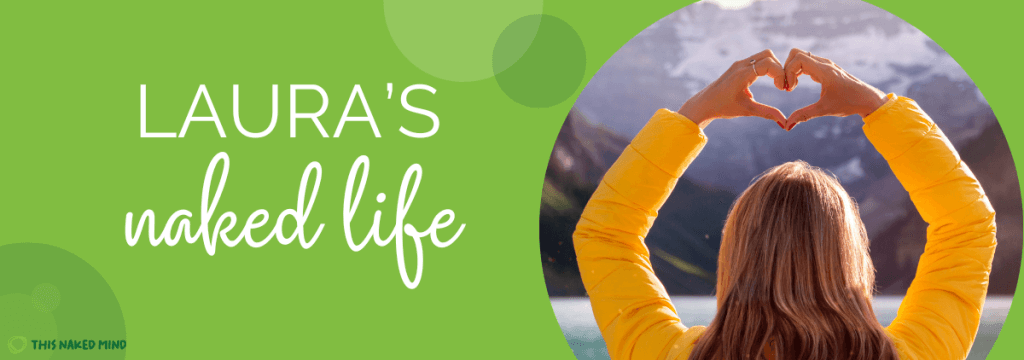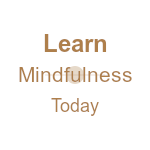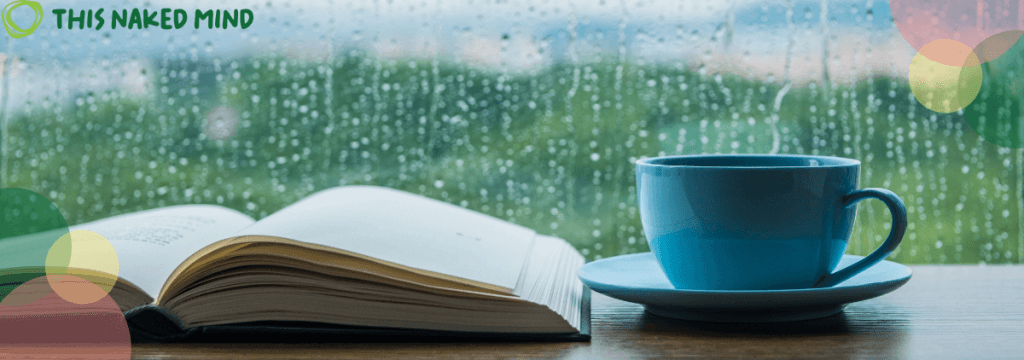
When Alcohol Was My Best Friend – Laura’s Naked Life
How do you end a friendship that’s lasted over three decades? That’s the question Laura found herself asking as she began to examine her relationship with alcohol. Through marriage, divorce, career success, devastating loss, and health scares, one thing remained constant in her life. As Laura puts it, “Alcohol was my best friend” – always there when she needed comfort, celebration, or simply a way to cope. But her story shows what happens when you start to question whether your most dependable companion is actually serving your highest good.

Early Foundations: Learning What Friendship Looked Like
Growing up, I learned early that alcohol was simply part of how adults had fun together. My brother and I would hang out in the basement with all the neighborhood kids while the parents got wasted upstairs. There was this one Halloween party at our house where one of my parents’ friends came into my room dressed up and completely freaked me out. Looking back, I think he only would have done something like that while impaired, not intentionally trying to scare me. But even then, the message was clear: alcohol was how you connected with friends and had a good time.
This pattern continued through high school, where my life balanced sports with weekend parties and drinking. It all felt completely normal. College was more of the same until I made a significant change, moving universities and switching my degree more than two-thirds through my college career. Even though life changed dramatically, alcohol remained a constant presence.
When I moved back to live with my father after college – someone I didn’t know very well due to my parents’ divorce – we built a strong relationship together. And alcohol was a big part of how we connected. It was the bridge that helped us navigate those initially awkward moments and find common ground.
The Friendship Deepens Through Life’s Challenges
Fast forward through the next 30+ years of my life – marriage, divorce, raising four children, losing my youngest child at 22 years old, major family health issues including breast cancer for both me and my children. Basically life happened, as it does for everyone, and through it all, alcohol was the consistent friend along the way.
During my marriage, I found myself overwhelmed as the primary breadwinner while being a mother of four with a full-time job. Alcohol after work helped me wind down, but it also impacted my ability to make the smartest decisions. I started feeling like joy was hard to find. While my husband remained my best friend, I began gravitating toward a group of single women at work who were living life in a way I felt I had given up.
This new friend group helped me feel like I fit in at work in a way that gave me the acceptance I was seeking. But it also involved group drinking after work, contributing to my feeling that I was missing something in life. While my career continued to thrive, this led to more drinking and more poor choices, ultimately contributing to our divorce.
Ready to change your relationship with alcohol?
If you’re feeling like alcohol is your best friend and are ready to explore a different path, join Annie Grace’s free masterclass on How I Went From a Decade of Daily Drinking to Happily and Effortlessly in Control… (WITHOUT Feeling Miserable or Deprived!). This class will give you the tools you need to take back control over your drinking and find freedom. Take the first step towards living a life you love, without the hold of alcohol.
When My Best Friend Became My Biggest Challenge
The divorce brought even more stress, and I turned to drinking as a way to manage pain and negative emotions rather than for social reasons. When COVID hit, my drinking escalated further. Then came the devastating loss of my son, and I felt alcohol was the only way I could deal with the grief. In some ways, I felt guilty about his death, wondering if I had contributed to it by exposing him to the lifestyle where drinking was normalized.
A double mastectomy for both me and my eldest daughter brought additional challenges to navigate. Through every single life event – the good, the bad, and the devastating – alcohol was there. It felt like my most reliable companion.
But somewhere along the way, I began to realize that this friend wasn’t serving me the way it used to. My health was taking a toll, and I suspected alcohol was somewhat to blame. Joy seemed to be missing from my life. I didn’t look forward to things anymore. It seemed like I was always tired. I had stopped working out. The very thing that had been there for me through everything was now contributing to a life that felt flat and colorless.
The Moment Everything Started to Change
Then a long-lost friend from middle school came back into my life after my son’s death. She was questioning her own relationship with alcohol, which suddenly put a lens on my own drinking. We began to share our struggles long-distance, and she introduced me to Annie Grace’s work.
That’s when the dissonance started. Suddenly, I had access to education and science that explained what was happening in my brain and body. I began listening to Annie’s podcast daily, starting with episode one of This Naked Mind. I’m now on episode 197 – over 100 days of listening and learning.
The science behind addiction and alcohol’s impact on our bodies and minds is remarkable. I can’t unlearn what I now know. Now it’s just a matter of taking those steps to move forward and make progress, which is where I struggle most.
Recognizing the Red Flags I’d Ignored
Looking back, there were clear warning signs that my relationship with alcohol was problematic. A DUI just after graduating college impacted my first career job at a major public accounting firm. Alcohol contributed to an unplanned pregnancy at 24, just three months after meeting someone who would become my husband. While we did marry 18 months later and had four beautiful children together, the foundation was shaky from the start.
As I’ve aged, alcohol’s impact has become more pronounced, primarily because my ability to metabolize it has diminished – something Annie explains clearly in her podcasts. I’ve tried controlling my drinking by abstaining for 9 days, 30 days, or periodically here and there, but never permanently.
I’m completely open with my daughters and my significant other about my challenging relationship with alcohol, and they’re all very supportive. But I’m still waiting for that trigger, switch, or whatever it is that will call me to make a permanent change.
Learning to Question a Lifelong Friendship
Through Annie’s work, I’ve learned that what I thought was friendship was actually something much more complex. For decades, I believed alcohol was my best friend because it was always there when I needed comfort, celebration, or just a way to cope. But real friends don’t leave you feeling worse about yourself. They don’t contribute to poor decision-making or health problems. They don’t make it harder to find joy in life.
The education I’ve received through This Naked Mind has been transformative, even though I haven’t been able to stop drinking permanently yet. I continue to educate myself because I’m looking for control or freedom in my life and my drinking. Understanding the science behind alcohol’s effects has changed how I view this relationship entirely.
Working Toward a Different Future
My life is still very much a work in progress, and I think it always will be. My goal is to feel free and in control, and I’m not entirely sure if that’s just related to alcohol or encompasses more aspects of my life. But I’m working on a journey to find out.
What excites me – and honestly scares me – is discovering what realizations this journey might bring to my reality. I’m learning that questioning long-held beliefs about what serves us requires courage, but it’s also where real growth happens.

If I could tell my past self one thing, it would be: “Keep up the good fight. Your intentions are good – kindness is the foundation on which you operate. Goodness will win. Just be patient, and you will realize what is meant for you, whether that’s something new, different, or just as you are.”
Finding Real Support in the Journey
The difference between thinking alcohol was my best friend and finding actual support has been profound. Real support comes from community, education, and tools that help you build the life you want rather than just cope with the life you have.
Through Annie’s work and connecting with others on similar journeys, I’m learning what genuine friendship and support actually look like. It’s not about having something that’s always available to numb difficulties – it’s about having resources that help you grow stronger and more resilient.
My story isn’t finished. I’m still working on creating the relationship with alcohol that serves my highest good. But I’m no longer doing it alone, and I’m no longer relying on something that presents itself as a friend while actually holding me back from the life I want to live.
The journey from dependence to freedom isn’t linear, and it’s not always comfortable. But it’s real, and it’s leading me toward a version of myself that I’m excited to discover.
Share Your Story
Did you realize your friendship with alcohol was a toxic one through our books, the app, the podcasts, or another program at This Naked Mind? We want you to share your story here and inspire others on their journey!
Copyright © 2025 This Naked Mind. This material is original content and is protected by international copyright laws. Unauthorized reproduction or distribution of this content will be met with legal action.


